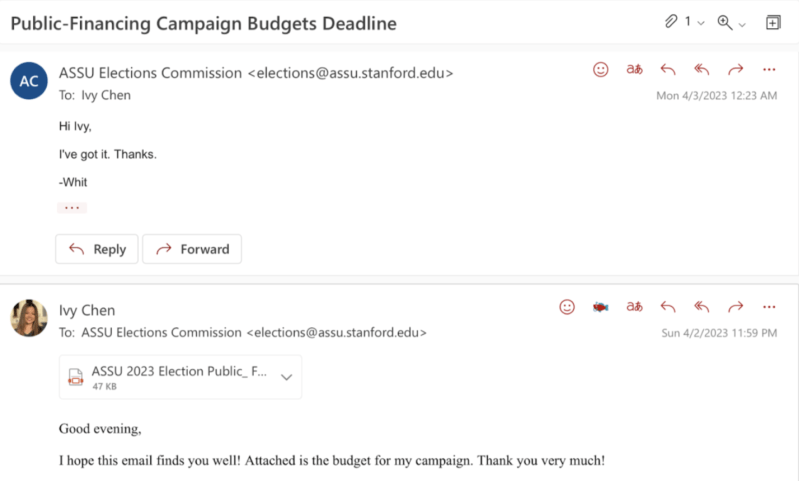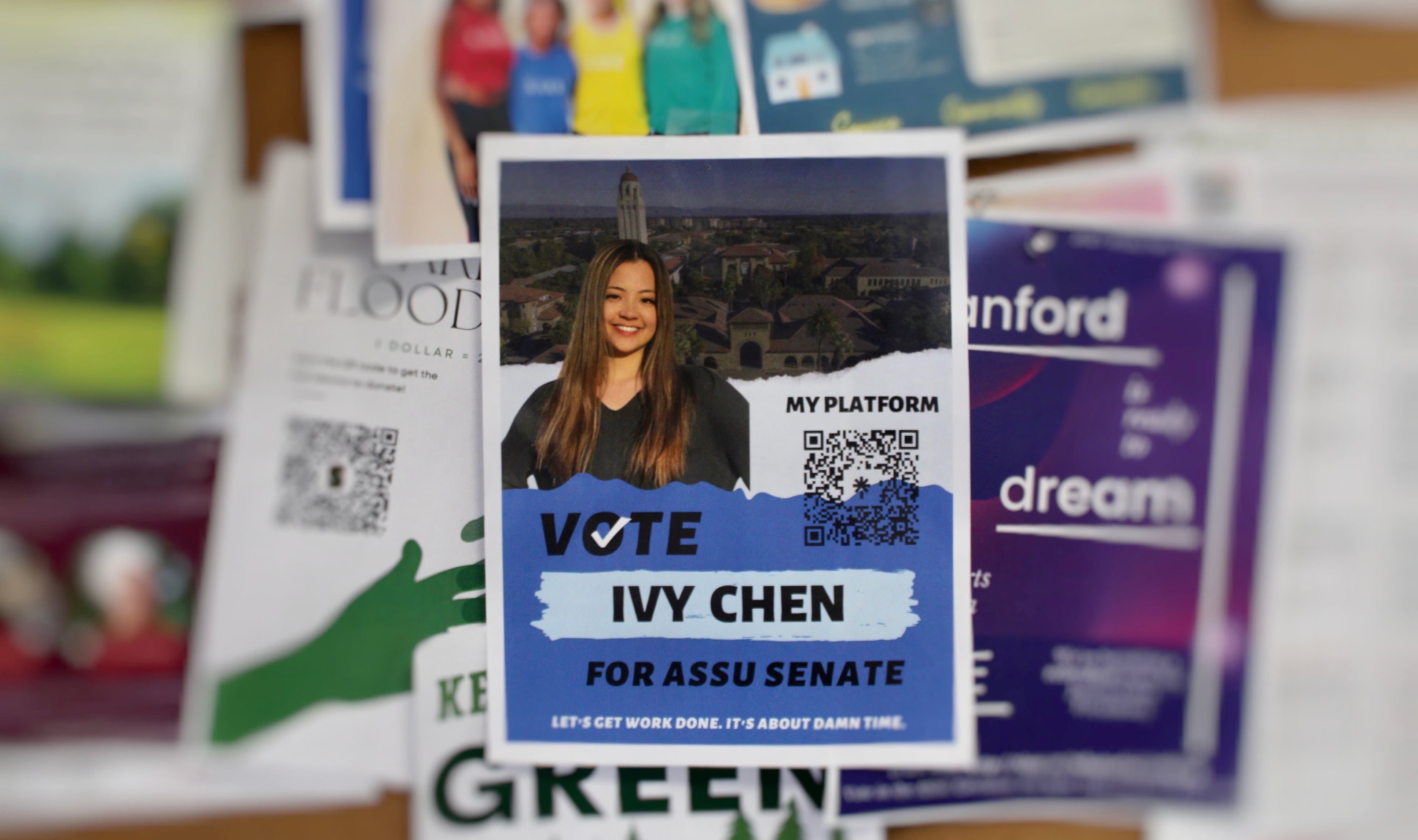The ASSU Constitutional Council voted unanimously to hear Elections Commissioner v. Chen in a meeting on Tuesday night. The hearing of the suit against the recently elected ASSU senator will be held on May 1 at 5 p.m.
Ivy Chen ’26 was one of fifteen students elected to the 25th Undergraduate Senate (UGS). She received the highest number of votes of all candidates with a total of 1096, 326 more than the following candidate.
On April 18, ASSU Election Commissioner Whit Froehlich J.D. ’24 submitted a petitioner’s complaint against Chen to the Chair of the Constitutional Council of the ASSU. The complaint listed two violations of the Joint Bylaws of the ASSU, which were last updated in 2014.
The first violation related to Chen’s late submission of her campaign expenditures. All candidates were required to file their receipts documenting campaign expenditures by 11:59 p.m. on April 16 through a Google Form sent by Froehlich. Chen submitted her receipts at 12:25 a.m. on April 17, 26 minutes after the deadline.
Chen said that she had no malicious intent or motivation behind submitting late. “I had all my receipts and all the information loaded onto the Google Form but then the WiFi didn’t work on my computer. It was all out of my control,” Chen said.
Chen said that she moved from her dorm, Florence Moore Hall, to Old Union to connect to better WiFi. She said she was able to find a stable network connection at The Axe & Palm where she submitted the Google Form late.
The second complaint alleged Chen’s violation of the $100 spending limit on campaign expenditures — Chen documented spending $122.75 on materials such as flyers and tape.
Chen said that the $100 limit was only mentioned in an optional candidate orientation held on March 25 and was not communicated in any of Froehlich’s emails to the candidates. “All he said was there was a $100 campaign limit… the way I interpreted it was that I could spend up to $100 and get reimbursed $100. Anything else beyond that I thought I could cover with my own money.”
Froehlich wrote in his complaint that the timeline for submission and campaign expenditure limits “were communicated to candidates on the ASSU website as well as at the Candidate Orientation held on March 25th, 2023, and made available as a recording for later viewing.”
According to Froehlich’s complaint, the role of the Elections Commissioner entails duties such as conducting the elections, maintaining the elections schedule, communicating with candidates and the student body, operating elections infrastructure, and tabulating results. The complaint continues that Froehlich “is implicitly tasked with detecting violation of campaign rules.”

Froehlich’s petitioner’s complaint includes a screenshot of Chen’s responses to the campaign expenditures form. (Screenshot: MARK ALLEN CU/STANFORD DAILY)
Acting Executive Director of the Stanford Constitutional Law Center Rebecca Talbott ’02, in her personal capacity, told The Daily that she hopes the dispute over Chen’s “minor” violations will be resolved in “a more understanding and less intimidating manner.”
Talbott said that she believes Chen finds the situation “overwhelming, unfair and breathtakingly disproportionate” as she believes Chen, a college frosh with no legal training, is being forced to “weigh in on highly legalistic questions that she would have no idea how to respond to.”
“My worry is that this experience will prove scary, intimidating, alienating, and spirit-crushing to her, and risk forever dampening the positive, school-spirited, and public-focused energy that prompted her to be a candidate for student senate in the first place,” Talbott said.
On April 3, Chen sent her original proposed budget of $640 to Froehlich. According to screenshots included in her response to the complaint, Froehlich did not correct or comment on her budget. “I should not be held to a rule by someone who, when given the exact opportunity to correct my misunderstanding, said nothing,” Chen wrote in her response.
In Froehlich’s complaint to the Constitutional Council, he wrote that Chen agreed to abide by the ASSU Constitution, Association By-Laws, and Election Code when she initiated her petition for candidacy. The campaign expenditure due date and $100 limit are included within these policies that Chen agreed to.

Chen sent her original proposed budget, which was $540 over the limit, on April 3. Whit did not comment on her budget before filing his petitioner’s complaint. (Screenshot: MARK ALLEN CU/STANFORD DAILY)
Prior to the hearing, ASSU Executive Vice-President Bikal Sharma ’24 wrote an amicus curiae brief in support of Chen, saying that the Constitutional Council should refuse to hear the case Elections Commissioner v. Chen on the grounds of Froehlich’s lack of standing, or an inability to show how the respondent injured or harmed the petitioner.
In his brief, Sharma wrote that he was “compelled” to express his opinion on the case because he said he believes its outcome will affect future ASSU elections. “What should have been an enforcement matter for the election commission turned into a possibly landmark case about fundamental powers of the Constitutional Council and student free speech,” Sharma wrote, referring to whether or not campaign expenditures constituted freedom of expression.
Lodewijk Gelauff, a Ph.D. candidate in management science and engineering and former member of the Constitutional Council, wrote in his amicus curiae brief that campaign expenditure restrictions enforce the “educational purposes of the University.” He argues that these limits ensure that all candidates have an equal opportunity “without sacrificing their educational career or exhaust their means of survival.”
Chen will be represented by Eli Tannenwald J.D. ’25 and Froehlich will be representing himself as Election Commissioner. The two parties will be presented before the ASSU Constitutional Council, a body of five undergraduate and graduate students led by Council Chair Sherwin Lai ‘24.
On Tuesday, the Council met to decide whether or not to accept the case. The council unanimously voted to hear the case and scheduled the hearing on Monday over Zoom.
According to Article V Section 4.C of the Joint Bylaws, if the court finds that a candidate is in violation of campaign regulations, the court will “enact an appropriate sanction.” One of the standard sanctions is disqualification.
“I feel like [Stanford] should be more active and passionate about having student voices in our administration. This is why I’m taking my campaign and this entire situation very seriously… I’m not dropping out of the race,” Chen said.
This article has been updated to clarify the Joint Bylaws on campaign regulations.
A previous version of this article misinterpreted Talbott’s statement and misspelled Froehlich’s name, and incorrectly identified the Constitutional Council as being only formed of undergraduates. The Daily regrets these errors.
